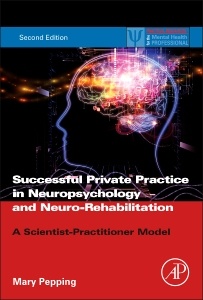Description
Successful Private Practice in Neuropsychology and Neuro-Rehabilitation (2nd Ed.)
A Scientist-Practitioner Model
Practical Resources for the Mental Health Professional Series
Author: Pepping Mary
Language: English
Subject for Successful Private Practice in Neuropsychology and...:
320 p. · 15x22.8 cm · Paperback
Description
/li>Contents
/li>Biography
/li>Comment
/li>
This second edition (of the original Successful Private Practice in Neuropsychology) provides an updated overview of key principles and processes for establishing, maintaining and developing neuropsychology practice and neuro-rehabilitation program (NRP) treatment in medical center and/or private practice settings. Essential elements of an entrepreneurial model that work well in the medical center context and the necessary role of variety and peer review in the private practice setting are also discussed.
ForewordPreface1 THE CHALLENGES OF PRACTICE: OVERVIEW OF KEY ISSUES AND EFFECTIVE SOLUTIONS2 OTHER POTENTIAL INDIGNITIES3 THE GOOD NEWS4 GETTING STARTED: PRACTICAL PRELIMINARY QUESTIONS5 A PRACTICAL GUIDE FOR OPENING YOUR BUSINESS6 MARKETING AND OTHER MATTERS7 CREATIVE APPROACHES TO FINANCIAL ISSUES8 MEDICAL-LEGAL WORK9 CONSULTATION AND SUPERVISION PRACTICE10 PSYCHOMETRIC CONCERNS11 TREATMENT PRACTICES FOR NEUROPSYCHOLOGISTS12 NUTS AND BOLTS OF YOUR EVALUATION PRACTICE13 NEURO-REHABILITATION PROGRAM TREATMENT: PRINCIPLES AND PROCESS14 HOW TO DESIGN AND IMPLEMENT A COGNITIVE GROUP15 THE VALUE AND USE OF THE MMPI IN NEUROPSYCHOLOGICAL PRACTICE16 DESIGNING AND IMPLEMENTING A CLINICAL NEUROPSYCHOLOGY FELLOWSHIP17 RESEARCH AS A DAILY REALITY18 SUMMARY AND CONCLUSIONSAppendices
Dr. Mary Pepping is a board certified neuropsychologist with 33 years of experience evaluating and treating working-age people and older adolescents with various forms of acquired brain injury. These include people with traumatic brain injury, brain tumor, stroke, multiple sclerosis, anoxic injuries, residual effects of neurological conditions such as meningitis, encephalitis, Huntington Disease, early-onset Parkinson disease, lupus, normal pressure hydrocephalus, and various forms of dementia. Dr. Pepping has long-standing involvement in neuro-rehabilitation of these populations of individuals. This includes an emphasis on detailed neuropsychological evaluations as a foundation for treatment, cognitive rehabilitation and psychotherapy in a milieu model context, and the role and functions of interdisciplinary teams to achieve good outcomes.
With her PhD in Clinical Psychology completed 1981 from Washington State University she went on to a postdoctoral fellowship in Clinical Neuropsychology at the University of Washington School of Medicine. After fellowship she spent six years in the Section of Neuropsychology, Department of Neurosurgery, at HCA Presbyterian Hospital in Oklahoma City, OK, directing the milieu-based treatment program there in her final two years. This was followed by a return to Seattle to work for five years in the Physical Medicine and Rehabilitation Department at Virginia Mason Medical Center, continuing with evaluation, treatment and clinical research.
After a subsequent six years in private practice, Dr. Pepping was recruited by the Department of Rehabilitation Medicine at the University of Washington Medical Center to serve for 14 years as Director of their Neuropsychology Service and outpatient interdisciplinary Neuro-Rehabilitation Program. Her years at the University of Washington School of Medicine gave her additional opportunities to provide teaching and training to interns, residents, fellows and practicum students from a
- How to gather and report NPE and other evaluation findings with a neuro- rehabilitation focus that lead to specific neuro-rehabilitation recommendations. Benefit: this will make your evaluations and reports more desirable and sought after in the setting and community where you work.
- Updated billing/diagnostic code recommendations to accurately capture the actual time spent in evaluating and/or treating patients. Benefit: increased appropriate billing and collections for your time
- Recommendations for clinical neuropsychology postdoctoral fellowship training of a Navy psychologist. Benefit: you may be able to obtain funding for an experienced Navy clinical psychologist who wants formal training in neuropsychology. This can expand your clinical services, increase variety and quality of your training program and ultimately support improved care for returning American military personnel.




